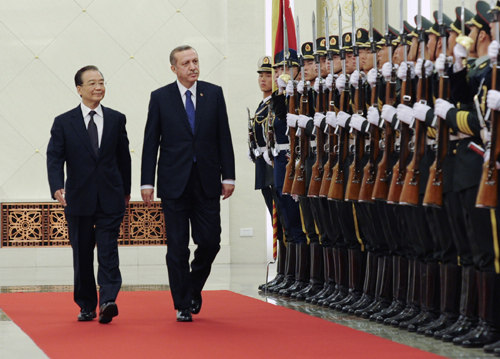|
 |
|
WELCOME TO CHINA: Chinese Premier Wen Jiabao welcomes visiting Turkish Prime Minister Recep Tayyip Erdogan in Beijing on April 9 (ZHANG DUO) |
Occupying a special geographic position bridging Asia and Europe, Turkey has been playing a flexible role in affairs of both continents. In recent years, Turkey has changed its previous strategy of looking predominately to the West and revalued its cooperation with the East, especially with emerging markets in the East like China. Experts point out that Turkey's strategic adjustment will help it exert a greater influence in the Middle East and the Arab world. And the improved Sino-Turkish relationship is going to benefit both sides.
Turkey's biggest city, Istanbul, sits in Europe. But its capital, Ankara, belongs to Asia. Turkey used to be a country that wholeheartedly stood together with the West. In recent years, the Turkish Government changed its policy and emphasized more on the East. This is a wise decision for Turkey, because it will enable the country to have a greater say in the Middle East and the Arab world, instead of simply following the West.
"Turkey has been an important country in the Middle East due to its special geopolitical advantage," said Wang Jinglie, a research fellow with the Institute of West Asia and African Studies at the Chinese Academy of Social Sciences (CASS). Wang said the unique geopolitical significance is also the reason why Europe and the United States attach importance to Turkey. In 1952, Turkey became a member of NATO.
Turkey is very proud of this advantage. It is the only Islamic country in NATO, and the only Asian member of the U.S.-led military alliance. Turkey's predecessor, the Ottoman Empire (1299-1922), where Western and Eastern civilizations coexisted for more than six centuries, was an Islamic empire across Asia, Africa and Europe that played an important role in the Middle East. Turkey has been in close cooperation with the West, and the United States keeps several military bases in Turkey.
From the 1920s to the 1930s, Turkish President Kemal Ataturk conducted a revolution in the country and removed the theocratic system from the country, choosing the West's path of realizing modernization through industrialization. But the country is still an Islamic country, and religion still influences the country. For example, the current ruling party, the Justice and Development Party (AK Party), is known as a party with a strong Islamic background.
Turkey has desired to join the EU for a long time, said Wang, pointing out that Turkey also carried out reforms in political, economic and social areas for this purpose. The EU finally turned Turkey down, and the ruling AK Party decided to pay more attention to the East, he said.
"The EU will not easily accept Turkey as a member for political, economic and cultural reasons," said Wang. He explained that many European countries are worried about Turkey's Islamic identification. Besides, Turkey is still struggling between the two civilizations, and it has religious problems and ethnic conflicts, he added.
Turkey now has over 72.56 million people. By comparison, Britain, whose population currently stands at more than 62 million, will have 72 million people by 2050 according to UN estimates, the most populous EU member. If Turkey were to join the EU, it would occupy more seats in the European Parliament than many current EU members based on its big population, which is another reason why it is not welcomed by the EU, Wang said.
"Even if the EU approved its application, Turkey could only be a marginalized member in the organization. But if it decides to return to the Middle East, it will be an irreplaceable power in the region," Wang said.
Liu Yueqin, another research fellow with the CASS, pointed out that Turkey's rising position in the Middle East is closely related to the regional turmoil that has led to a wave of power shifts in the Arab world since early 2011. Now Syria has become a hotspot, making Turkey's position even more important, said Liu.
Turkey used to maintain a good relationship with the current Syrian administration. But it has taken a tough stance against the Syrian authorities and shown public support to the opposition. Turkey also has a big say in international envoy Kofi Annan's mediation efforts.
Because Turkey serves as the de-facto base camp of the Syrian opposition, if the opposition comes into power, Turkey will be more influential in regional affairs, Liu said. If President Bashar al-Assad holds onto power, he will not recklessly cut off normal relations with Turkey because he has more to worry about, she added.
| 